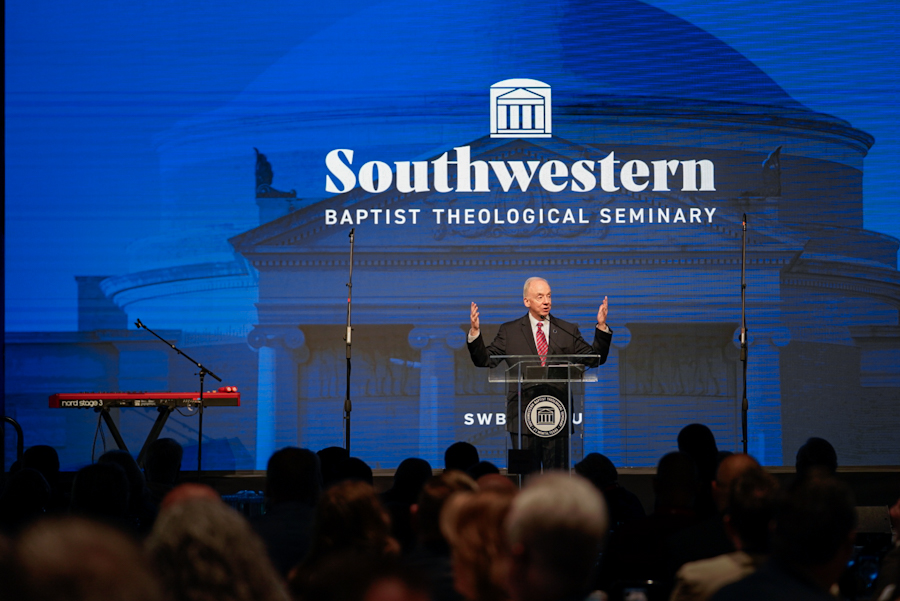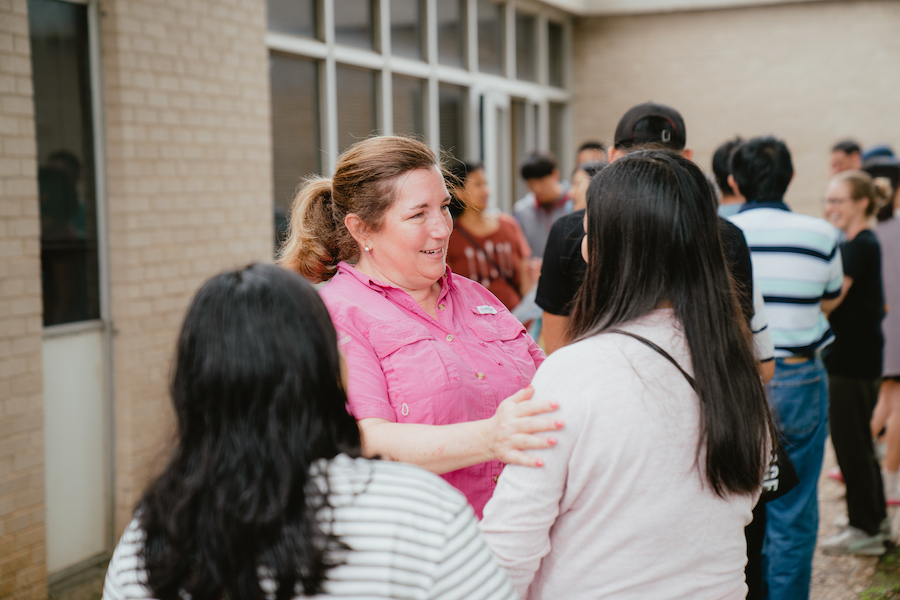The power of the Word of God in a lifetime of ministry: Charles Stanley’s obedience to the Lord yields fruit around the world
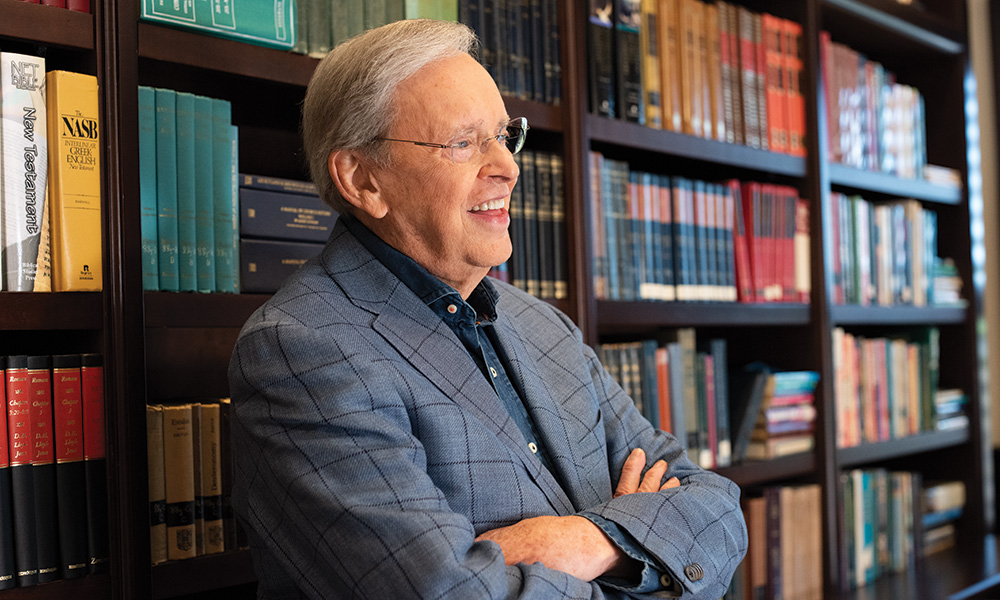
Editor’s note: this article appears in the Fall 2022 issue of Southwestern News.
Nestled in the Blue Ridge Mountains in Hendersonville, North Carolina, amid apple orchards, farms, streams, and trees whose orange, red, and yellow leaves merge to look like velvet rippling over the mountains in the fall, sits Fruitland Baptist Church. Pastoring the small church in a community of fewer than 6,000 people in the late 1950s is when Charles F. Stanley (’57) would have one of the most significant moments in his ministry.
With a recognizable voice that has never lost his native Virginia accent, Stanley has preached to millions of people worldwide during 60 years of ministry through his pastorates and In Touch Ministries, a global broadcast ministry he founded in 1977. But it was while leading the western North Carolina church as a newly-minted Bachelor of Divinity graduate from Southwestern Baptist Theological Seminary that Stanley would have an experience that would lay the foundation for a lifetime of pastoral ministry and preaching.
Across the street from Fruitland Baptist Church is Fruitland Baptist Bible College, an institution that trains pastors for ministry through a two-year program. As part of his calling to pastor the church, Stanley was invited to teach classes at the school to approximately 150 men enrolled as students who were already pastoring churches, and “here I was, right out of seminary, never pastored a church, didn’t know anything about pastoring, but I knew God told me to do it,” he recalls.
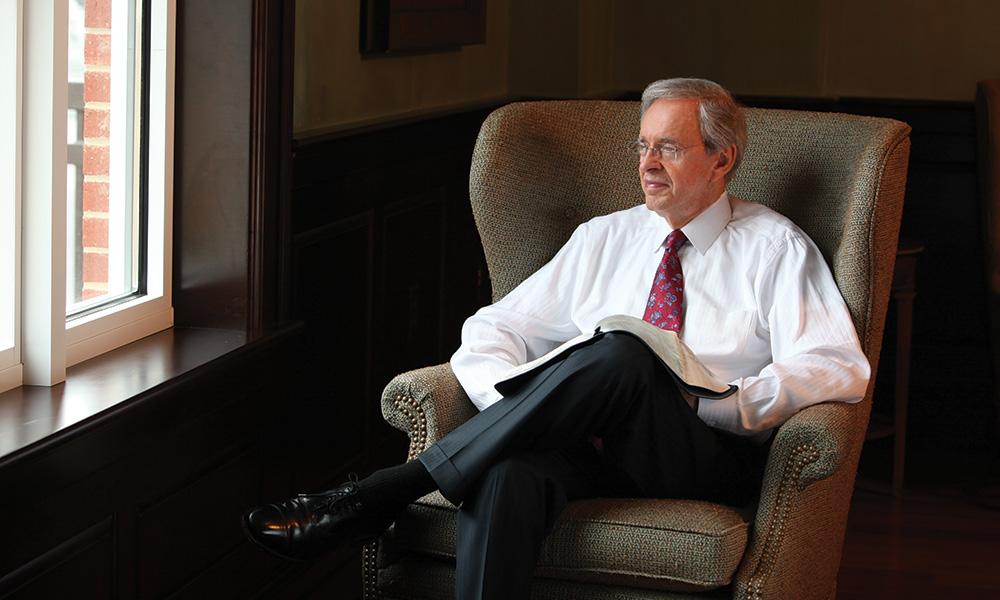
Charles F. Stanley, a 1957 Bachelor of Divinity graduate of Southwestern Seminary, has preached to millions of people worldwide during 60 years of ministry through his pastorates and In Touch Ministries, a global broadcast ministry he founded in 1977.
Stanley explains he sought the Lord, kneeling on a blanket that his mother knitted for him that he still has, as he prayed, “I don’t know how to do this. I don’t feel worthy of it. I don’t feel like I’m really equipped. But I know if You gave me the opportunity, that’s what You want me to do.” He wanted to be “completely reliant on the Holy Spirit” and “under His control.”
For the next two years, Stanley would pastor the small North Carolina church and not only teach his students the lessons of evangelism, preaching, and homiletics but simultaneously learn how “to defend what I believed in almost every class” as the students had numerous questions, he says.
“It was a real challenge,” Stanley remembers. “But I felt the Spirit of God was in me and on me—and He’s the One who opened the door. That’s how I got started.”
Stanley, who would join the staff of First Baptist Church of Atlanta in 1969 and assume the role of senior pastor in 1971, a role he held until his retirement in September 2020 when he was named pastor emeritus, came to faith in Christ as a 12-year-old growing up in Virginia. His father passed away when he was nine months old and he was raised by his mother. And, since his birth was near the onset of the Great Depression, he explains, “we didn’t have a lot.”
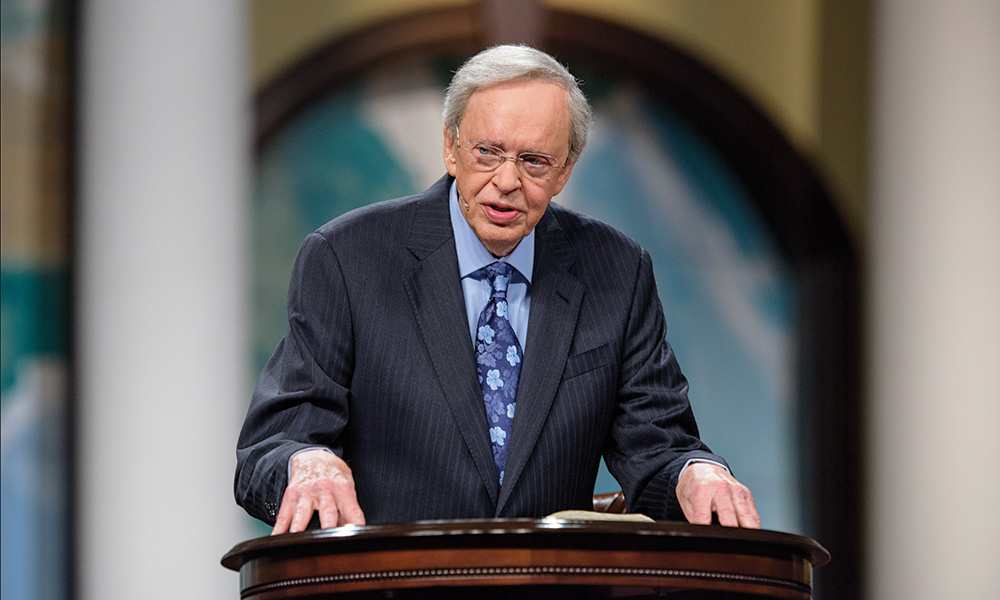
Stanley served as senior pastor of the First Baptist Church of Atlanta from 1971 until his retirement in 2020 when he was named pastor emeritus.
As a 14-year-old, Stanley and his best friend Raymond were “sitting on the benches outside on the ball field.” Like many teenagers who wonder what they will do when they grow up, Stanley wondered the same about his friend as he asked, “Raymond, what are you going to do when you grow up?” The friend replied he did not know and asked Stanley the same question, to which Stan ley replied, “I don’t know,” though, as he explains, he “was sort of afraid to say it,” although he later discovered both he and Raymond “knew we were going to preach.”
Stanley earned his undergraduate degree at the University of Richmond and began as a student at Southwestern Seminary following graduation in 1954. Though there were seminaries “that were closer” to his Virginia home, he “found out that Southwestern was the most conservative” and “that’s where I went.”
During his time of study on Seminary Hill, Stanley was influenced by his preaching professor, H.C. Brown, who “was kind enough” to answer his questions, and Huber Drumwright, who would later become the dean of the School of Theology, but who as a doctoral student, taught Greek and New Testament to Stanley. The lessons Stanley learned in his preaching and Greek classes are those he still makes use of today. He explains that he was “influenced in lots of ways” while at Southwestern, but “primarily” through being “biblically sound.”
“I heard enough at Southwestern that I could defend what I believed,” Stanley observes. “I think that was powerful for me because people are always asking questions. And when people talk to me about going to seminary, I tell them to go to Southwestern. I have recommended a lot of people to go to Southwestern.”
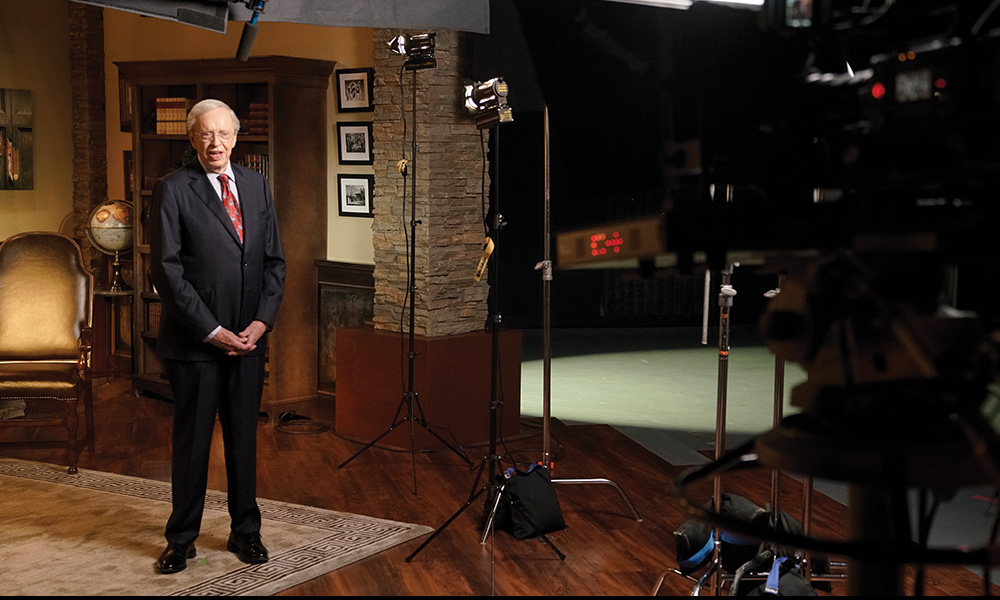
Stanley started a 30-minute television program in 1972 called “The Chapel Hour” while he pastored First Baptist Church of Atlanta. The ministry grew and in 1977 became In Touch Ministries, a global broadcast ministry that still exists today.
In 1972, while pastoring First Baptist Atlanta, Stanley began “The Chapel Hour,” which was a half-hour television program in the Atlanta area. He explains the “original vision” of what would, in 1977, ultimately become In Touch Ministries “was to get the message outside the four walls of the church. And then, it was to get it out of Atlanta.” Following this prayer, Stanley began to ask God, “How do we get the message outside the four walls of the church?”
God’s answer would come as Stanley “was preaching Sunday after Sunday” and Pat Robertson, founder of the Christian Broadcasting Network, contacted him and “said they needed some sermons.” Stanley recalls that he provided the sermons and “the program got popular pretty fast” which led to continuing the program and “we began to grow.”
Reflecting on 45 years of ministry through In Touch, Stanley says, “it wasn’t anything I was doing—I was just preaching the Word like He showed me to do.” With both the growth and advancement in technology, he “began to realize, as time changed, communications changed,” noting the computer, the Internet, and other advances. The realization made Stanley think, “Well, God, it’s possible to reach the world with the Gospel of Jesus Christ” explaining “that’s been my goal.”
“What can we do to reach as much of the world as possible in my lifetime?” Stanley asks.
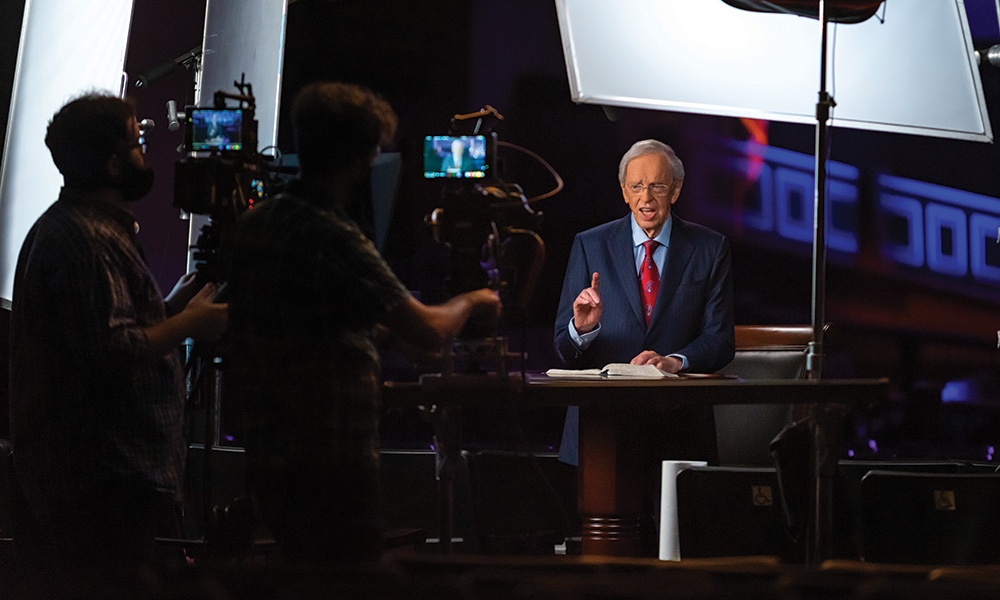
Stanley also established the In Touch Magazine in 1980 which was an additional outlet of his ministry, In Touch Ministries.
Two years after founding In Touch, in 1979, In Touch magazine began as a newsletter and in 1980 “In Touch with Dr. Charles Stanley” began airing daily across the United States through television and radio broadcasts. The ministry reports that Stanley’s sermons are daily broadcast globally to 3,600 radio, television, and satellite outlets and through the In Touch Ministries website, intouch.org.
Stanley quickly credits the Lord for what He has done through In Touch Ministries as he notes “there’s no explanation for what In Touch has been able to do except God. He has done it all. Nobody else can take credit for it.”
In September 2021, the board of directors of In Touch Foundation, the charitable subsidiary of In Touch Ministries, approved full funding of the Charles F. Stanley Chair for the Advancement of Global Christianity at Southwestern Seminary. The Stanley Chair was the first fully funded, endowed academic chair at the current $2 million funding level in the history of Southwestern Seminary.
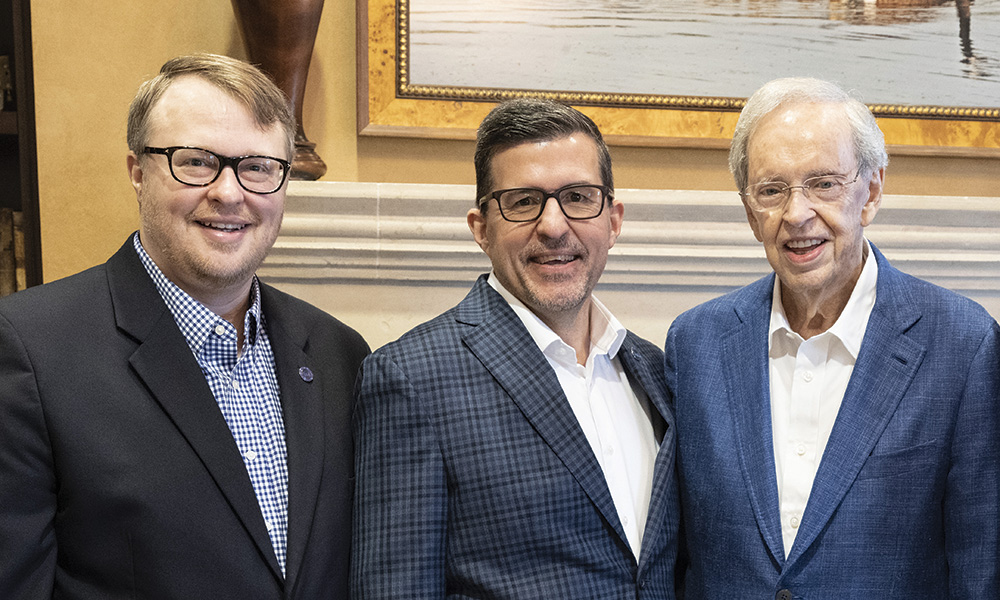
In 2021 the In Touch Foundation honored Stanley with the Charles F. Stanley Chair for the Advancement of Global Christianity at Southwestern Seminary. John D. Massey, dean of the Roy J. Fish School of Evangelism and Missions, is the inaugural occupant of the Stanley Chair.
Stanley says being honored with the Stanley Chair left him “surprised.” He says the chair in his honor, which is held by John D. Massey (’00), dean of the Roy J. Fish School of Evangelism and Missions, makes him think of “these young people who come from all over the world to study at Southwestern and to reach their people for Jesus.” He recalls when he “was starting out” and like many of the students who come to study at Southwestern, he “had nothing.”
“But there was a pastor—Reverend Hammock—who helped me,” he remembers. “He worked it out so I could have a four-year scholarship. So, I am very grateful to take part in helping these young people be able to do what God has called them to do.”
The impact of Stanley’s ministry extends not only through his broadcast ministry, but also through his writings. The author of several books, Stanley’s topics focus on “the questions that people have” and his desire to “clarify the topics that cause them confusion” as he desires to “help people with the difficulties they face daily,” most notably “in the practical things.”
“And I want to defend the truth of the Word of God,” Stanley concludes. Noting that “Scripture plays a role because it is the foundation of everything I write” because “Scripture is absolutely sufficient for every aspect of life,” he explains.
“Sometimes people say, ‘Well, I don’t find the answer for what I’m asking in Scripture,’” he adds. “Well, it’s not because it’s not there. It may be because you don’t know where to find it. And you should not be embarrassed or feel ashamed in any way to have to ask somebody, ‘What does the Word of God teach about this?’”
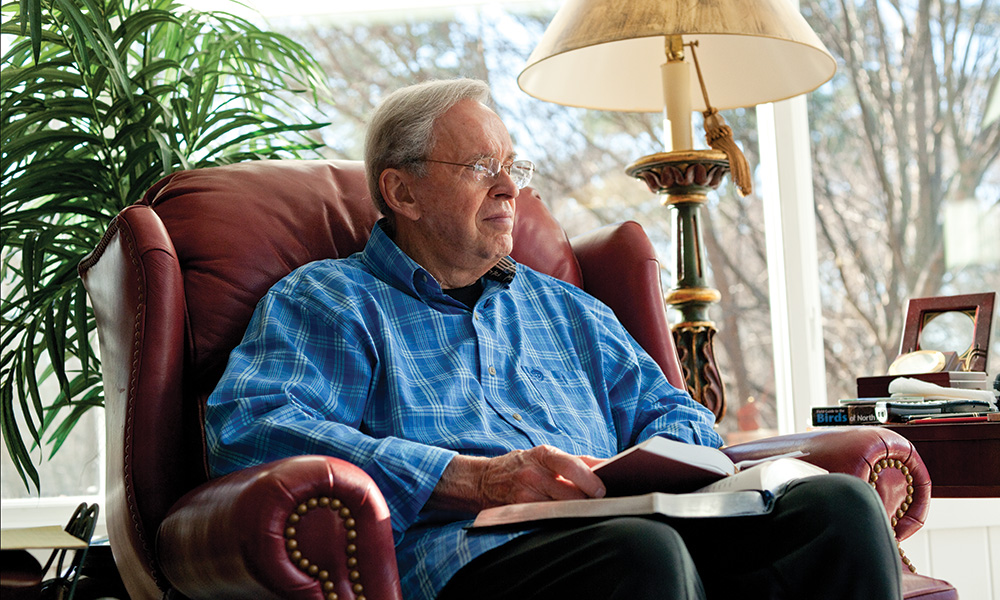
Even at 90 years old, Stanley still holds to the fact the standing on the Word of God is one of the greatest things anyone can do.
The authority and sufficiency of Scripture is a hallmark of Stanley’s teaching, as evidenced in his sermons where he articulates the application of God’s Word to the practical areas of daily life in both theologically deep and understandable ways.
Standing on the Word of God is the first of five points of advice the 90-year-old Stanley says he would give young ministers today.
“Make the decision: ‘I believe this Bible from cover to cover. I do not doubt the Word of God,’” Stanley asserts. “I think you need to settle that right up front. If you don’t, you’ll have questions. Questions are fine. You’ll have questions. But if you start doubting the Word of God by listening to error, then you’re going to have a problem with your preaching—it won’t have any power. You’ll just be talking instead of expounding the Word of God.”
In addition to the authority and sufficiency of Scripture, Stanley adds that reliance on the Holy Spirit, prayer, dying to self, and personal holiness are four other areas that are important to young ministers who are beginning in ministry.
Stanley says a “basic foundation” of preaching, alongside the Word of God, “is reliance on the Holy Spirit” adding ministers should begin sermon preparation by “asking His direction for the sermon” and “if you’re studying for a message, and God convicts you, you stop . . . and deal with whatever God is convicting you about.” He says pastors who do not stop when the Lord prompts them will not “preach with power” and they will find themselves “preaching powerless ‘stuff,’ rather than the Word of God.”
The role of prayer in the life of a minister is also imperative, Stanley says, noting that young ministers “must recognize the power of prayer.”
“Whatever God does in your life, it will be directly related to how much time you spend with God in prayer, seeking His guidance and His direction, and being obedient to Him,” he observes. “Spend enough time on your knees talking to God and depending on the Holy Spirit—that will keep you straight. That’s the key. He will give you a clear vision of what He wants you to do.”
Additionally, Stanley says that a young minister needs “to be sure that self is not involved,” noting that he believes “there are many people that start out well, but pride is their downfall.”
He adds goals of a young minister must always be “pure.”
“If you are seeking to grow a big church or get recognition, promotion, or financial gain, you are on the wrong track,” Stanley cautions. “The Spirit of God will not bless that. You may impress people, but it will not be fruitful for God.”
Finally, Stanley emphasizes the “need” for a “holy life that is based on the Word of God” and that also includes the “discipline to be obedient to God.”
“Obey God and leave all the consequences to Him,” he concludes. “To me, that is the secret of everything. Your whole theology and faith are wrapped up in that. If you don’t obey God, all you’re proving is that you don’t trust Him. If you obey Him and leave all the consequences to Him, how can you fail?”
Stanley’s obedience to the Lord – traced all the way back to kneeling before the Lord as a young man in a western North Carolina town – has resulted in a fruitful lifetime of ministry that has resulted in Gospel advancement around the world. As he reflects on his decades of Gospel ministry, his hope is that his legacy is “that all of my effort had one ultimate goal: to reach as many people as possible, as quickly as possible, as clearly as possible, as irresistibly as possible, in the power of the Holy Spirit, to the glory of God.”
Ashley Allen (’03, ’09) is managing editor of Southwestern News.
Photos for this article were provided by In Touch Ministries.
